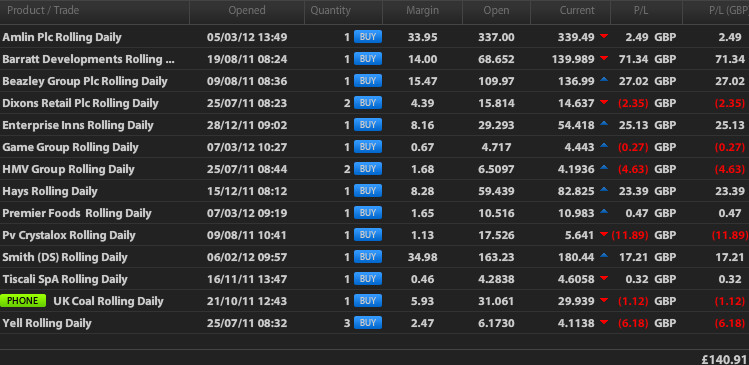Are You Making Money by Spread Betting?
Mar 9, 2012 at 10:00 am in General Trading by
Although some of us may speculate in the markets mainly for fun (even if we don’t admit this to ourselves), and some of us do it so that we have something to rant about (i.e. me), the main reason we’re doing it should be… to make money.
So I’d like to ask you: are you really making money, or are you merely providing yourself with entertainment?
You need to be honest with yourself about this, but how you measure your success may determine how honest you are being.
The Portfolio Snapshot
One way to assess whether you’re making money is to examine your portfolio snapshot, like this one for a very small account I’ve been running at ETX Capital:
It’s nicely in profit by almost £141, so that’s alright then. Or is it?
What if I told you that I deposited £250 into the account initially, and that the current “liquidation value” of the account — if I closed all my positions at the current prices — is £188? You would conclude that I am actually sitting on a net ‘paper loss’ of £62. Not a disaster, but a more accurate reflection of my current standing.
This illustrates the problem of a portfolio snapshot that takes no account of the financing charges, dividends, and banked profits and losses that have affected your cash balance along the way to your current portfolio. What’s worse is that if, like me, you try to cut your losses and run your profits, you will always be flattered by a portfolio that contains only the profitable survivors.
P&L Breakdown
Possibly a better indication of how well you’re doing is a proper Profit-and-Loss (P&L) breakdown, the best example of which is provided by IG Index. Here is what one of their 90-day P&L breakdown reports looks like for a different small account that I’m running:
You can see that this report takes account of the total cost of ownership (TCO) of each position during its life cycle. For example: my Ocado position closed for a final net profit of £48.06 once the financing charges amounting to £0.24 were deducted from the gross profit of £48.30.
Unless I’ve calculated incorrectly, my totalling of the ‘Total’ column comes to £126.01, which constitutes a real banked profit (not a paper profit) over the 90-day period. I know it’s not millions or even thousands of pounds, but do keep in mind that I run many such small accounts for journalistic reasons.
The current portfolio of open positions in this account is showing an additional ‘paper profit’ of about £107, so at this point I could estimate my overall profit (banked profit + paper profit) to be more than £230; which would be true if I had been running this account for exactly the 90 days covered by the P&L report.
Money In, Money Out (MIMO)
On a previous trading blog that I ran, one of my readers commented that the only true ‘acid’ test of whether you’re making money by spread betting is if the total amount of money you have taken out of your spread betting account is more than you ever put into it. For this reason, it may be useful to maintain a transcript of the Money In & Money Out (MIMO) like this one:
(deposit of £100 on 28/12/2011)
£100 in total deposited.
(deposit of £150 on 29/12/2011)
£250 in total deposited.
(deposit of £250 on 09/01/2012)
£500 in total deposited.
(withdrawal of £75 on 01/02/2012)
£425 in total deposited.
The account in question here is not yet in profit, in the sense that it still owes me £425. The good news is that the current liquidation value of the account is more than £600; so I’ll come out truly ahead by £175 if I cash in right now!
Conclusion
There are several different ways of looking at how well your spread betting endeavours are paying off. Some indications can be more deceiving and more ‘flattering’ than others. Some indications can be gleaned at a glance from the reports provided by your spread betting provider. Yet there is only one true ‘acid’ test of whether you are making money by spread betting:
“Have you taken out more money than you ever put in?”
Come on, be honest!
(none of the stocks mentioned in this article is a recommendation)
Tony Loton is a private trader, and author of the book “Position Trading” (Second Edition) published by LOTONtech.



